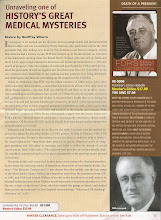Since publication of our book, perhaps the most frequent question I am asked is “Even if we now know FDR died of cancer, what’s the difference? This sentiment even rose to the level of a bad joke in the opening monologue on a recent Jay Leno show.
If one is to believe the conventional wisdom as espoused by the editors of the Annals of Medicine in the accompanying editorial to Howard Bruenn’s 1970 paper “We are given, by Dr. Bruenn, the picture of a great and gallant man, fatigued by the burdens of his office and by his hypertension and reduced cardiac reserve, yet quite able to exercise his judgment and to use the fruits of his unique knowledge and experience in guiding the war effort”, then the findings in each and every historical treatise about Roosevelt and his policies since this time should be considered valid. In fact, the reality of FDR’s health and the consequences of it upon his behavior and decision making are a far different story.
It is quite evident, despite the protestations of Howard Bruenn to the contrary, that FDR was well aware of his diagnosis and prognosis prior to accepting the 1944 Democratic nomination for president (we believe he knew it prior to the third term). The Lahey memorandum makes it clear that the president was informed, in no uncertain terms, on July 7th 1944, that he would not survive a fourth term. This had to have had a tangible effect upon Roosevelt’s thought process going forward, especially in light of the fact that he had personally witnessed the decline of Woodrow Wilson and the consequential failure to establish a successful world peace organization due to his marked infirmity. Roosevelt had a close personal relationship with Wilson’s physician, Cary Grayson, and the very same person who administered daily physical therapy to the hemiplegic Wilson, George Fox, later became Roosevelt’s daily personal medical assistant as well.
The establishment of the United Nations dominated Roosevelt’s thinking in the last year of his life. It is easy to see how different his approach might have been with an unlimited amount of time as opposed to the reality of his knowing of his race against death. How much did he then appease Stalin, whom he considered essential to any success?
By 1945, Roosevelt was barely functioning. Was he unable to comprehend the legitimacy of a Japanese peace offer brought to him in January 1945 by MacArthur? If he pursued it more vigorously would we have been spared the loss of hundreds of thousands of lives at Iwo Jima and Okinawa? Would it have been necessary to use atomic weapons in Hiroshima and Nagasaki?
If Roosevelt was able to focus on the information brought to him in March 1945 by General Albert C. Wedemeyer (who wrote he was in “never-never land”) about the future of China, or if he heeded the warnings of Governor George H. Earle about Stalin (instead of exiling him to Samoa) would there have been a Korean war? Would there have been a war in Vietnam? Would there have been a cold war?
All of these questions must now be revisited, based on the enhanced knowledge we now have about the thinking process and mental capabilities of the man responsible for making the most important decisions.
The cadaverous images of the cachectic Roosevelt at Yalta and the dozens of reliable reports of his diminished ability to function in the last year of his life are largely attributable to diseases not at all addressed until now.
So does it matter? Yes Mr. Leno, it surely does.
Saturday, January 23, 2010
Subscribe to:
Post Comments (Atom)





We shall never know, but I believe that a case can be made for the proposition that if the American people had known the nature and extent of FDR's illness, Governor Thomas E. Dewey, the Republican nominee, might have been elected to the presidency in 1944.
ReplyDelete